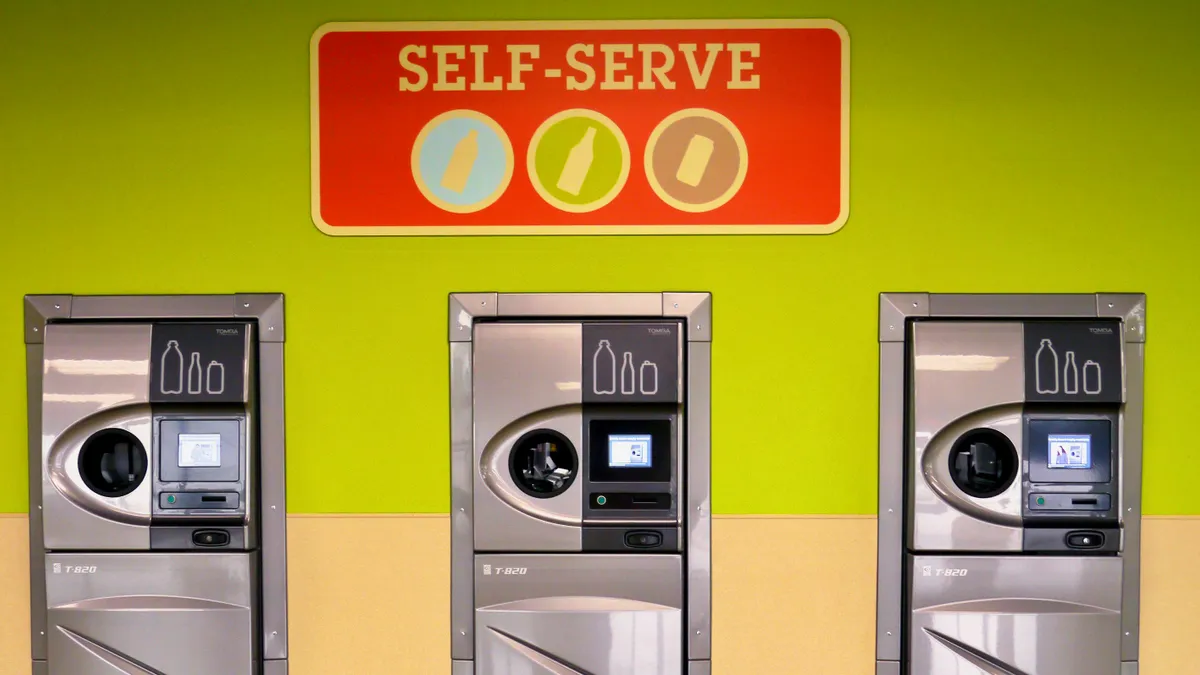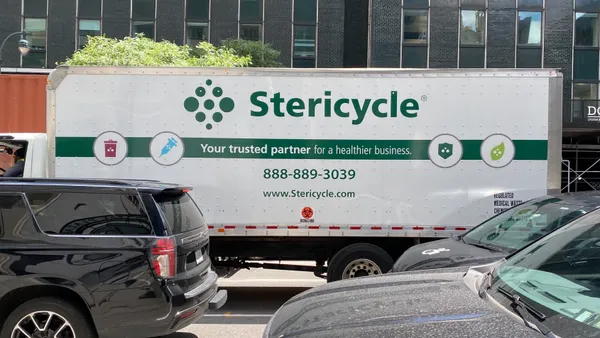Dive Brief:
- The Oregon Beverage Recycling Cooperative (OBRC) reports a marked increase in beverage containers redeemed through the state's bottle bill program, despite pandemic-related collection changes.
- OBRC administers the law and projects a record-breaking 2 billion containers will have been redeemed statewide at year's end, compared with 1.85 billion last year.
- Oregon's in-person retail redemption sites, such as grocery stores, suspended collection for 16 weeks earlier in the pandemic. Automated BottleDrop sites remained open and have picked up the slack, with some experiencing up to 25% more volume than usual, said Chief Stewardship Officer Jules Bailey.
Dive Insight:
Standard practices for beverage container redemption programs were called into question earlier this year due to fears over the spread of the novel coronavirus. When little was known about the virus and its transmission, most states with bottle bills temporarily suspended enforcement of requirements for retail establishments to redeem containers. That threw redemption program dynamics for a loop and concerns mounted about what would happen to beverage containers that weren't reclaimed as more people worked and ate or drank at home during the pandemic.
The prevalent assumption was that program suspensions would prompt consumers to recycle or throw away more beverage containers, and redemption programs consequently would experience reduced volumes. Not all states report data on a rolling basis like Oregon, though some have partial data. California experienced a 30% volume drop in reclaimed containers from March 14 to May 22 compared with last year, according to preliminary California Department of Resources Recycling and Recovery data. The agency expects to release final data for the first half of 2020 in the next few weeks.
Redemption program volume dips are an issue because the 10 container deposit states account for one-third of all used beverage cans that return to the system. Used beverage cans (UBCs) predominantly go into producing new cans, so collection interruptions have a negative effect on can supply. The Aluminum Association estimates the average aluminum can contains 73% recycled content, so a lack of recycled feedstock also means aluminum producers must resort to using more virgin material or slow their production lines.
Currently, aluminum can demand is surging as more people drink beverages at home, but supply is limited and a global aluminum can shortage has emerged. Part of this was set in motion even before the pandemic. Aluminum producers precipitously shifted away from can sheet toward the more profitable automotive sheet sector last year. That created less demand for UBCs. The pandemic turnabout has now created demand that can sheet producers cannot meet.
About 55% of the 1.85 billion containers redeemed in Oregon last year were aluminum cans, and its projected banner year for container redemption bodes well for lessening the aluminum can shortage. Growing research showing the small probability of contracting COVID-19 from contaminated surfaces is also seen as a positive sign.
"We have processed well over a billion containers this year and have yet to have any COVID cases tied directly to bottles or cans in bottle drops. Obviously, there's always a risk, but evidence shows containers are generally safe," Bailey said.
As states move to different phases of reopening, beverage container redemption programs are being phased back in. For example, last month Michigan required retail take-back to resume at locations that allow for minimal or no person-to-person contact.
Bailey credits much of OBRC's success with maintaining redemption volumes throughout the pandemic on its investment in the Green Bag program. Consumers fill bags with bottles and cans and deposit them at automated BottleDrop locations where they receive a credit, all without human intervention. The program processed up to 13,000 bags per day through January, but that jumped to 35,000 bags per day.
"People have really shifted their patterns to the Green Bag program and it shows they want that contactless option," Bailey said.











